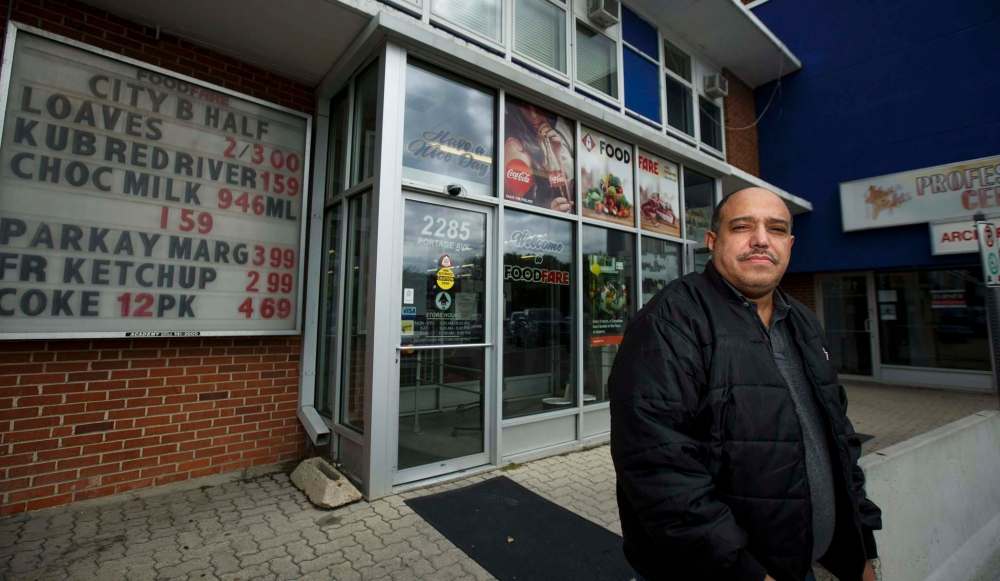‘Brazenness of the shoplifting has gone up’: Retailers grapple with age-old problem
Advertisement
Read this article for free:
or
Already have an account? Log in here »
To continue reading, please subscribe:
Monthly Digital Subscription
$0 for the first 4 weeks*
- Enjoy unlimited reading on winnipegfreepress.com
- Read the E-Edition, our digital replica newspaper
- Access News Break, our award-winning app
- Play interactive puzzles
*No charge for 4 weeks then price increases to the regular rate of $19.00 plus GST every four weeks. Offer available to new and qualified returning subscribers only. Cancel any time.
Monthly Digital Subscription
$4.75/week*
- Enjoy unlimited reading on winnipegfreepress.com
- Read the E-Edition, our digital replica newspaper
- Access News Break, our award-winning app
- Play interactive puzzles
*Billed as $19 plus GST every four weeks. Cancel any time.
To continue reading, please subscribe:
Add Free Press access to your Brandon Sun subscription for only an additional
$1 for the first 4 weeks*
*Your next subscription payment will increase by $1.00 and you will be charged $16.99 plus GST for four weeks. After four weeks, your payment will increase to $23.99 plus GST every four weeks.
Read unlimited articles for free today:
or
Already have an account? Log in here »
Hey there, time traveller!
This article was published 21/01/2019 (2518 days ago), so information in it may no longer be current.
Baby formula, fresh meat and alcohol are at the top of the list when thieves go ‘shopping’ at retail outlets.
Retailers say the overall theft problem — estimated to cost Manitoba stores more than $180 million in losses annually — may not be spiking, but offenders are definitely becoming more brazen.
John Graham of the Retail Council of Canada said thieves target items they believe they can sell quickly either to people on the street or online.

“Anything in high demand that is easily convertible is what they want,” Graham said Monday.
“There is also a market with organized crime, where individuals go in and select from grocery lists of items for conversion to drugs and cash. Fifty cents or less on the dollar is what they get, but it all comes back to the consumer (in the form of higher prices).
“The rate of shoplifting has been consistent for a number of years, but the brazenness of the shoplifting has gone up. And, for cities with high drug problems like meth, shoplifting is even higher.”
Theft from retailers nation-wide is estimated to be a $3-billion problem, according to the Retail Council of Canada.
To combat shoplifting, various retailers have decided to either not carry certain items, stock a smaller number or remove them from their shelves and sell it behind the customer service desk.
In September 2018, Manitoba Liquor & Lotteries Corp. made headlines when it confirmed it had lost about $800,000 worth of booze from its stores in the 12 months previous — and had ordered its security guards not to stop suspected thieves.
Since then, the union for Liquor Mart workers has suggested the outlets might have to turn the clock back and begin bringing bottles to customers from a secure area, instead of keeping it on shelves.
Munther Zeid, owner of the Food Fare location in St. James, said he can’t see grocery stores ever going back to the system of employees bringing items out to customers. He said he has implemented other measures to discourage theft at his location and at other Zeid family-run Food Fare stores — including one all his own.
“You can call me angry or Batman — I have a bat at all the stores,” Zeid said. “And my security is there to do something about it… My security knows nobody leaves the store with unpaid groceries.
“My recommendation and piece of advice: people don’t get caught shoplifting at Food Fare. You won’t like the outcome.”
Zeid said he and his staff watch customers closely.
“I’m not even waiting until they get to the door,” he said. “If I see (a item) go into something other than a shopping cart, I stop them.”
Zeid said, however, there’s a difference between people who are hungry and stealing to eat and the ones who are grabbing stuff to later buy drugs.
“People who can’t afford it, when they steal, they steal one, maybe two items. But when someone is filling a cart and, with it all filled, run out the door to a van — that’s organized crime.
“You don’t need to steal in Canada because there are more than enough social programs. People steal because they want to feed their addiction.”
kevin.rollason@freepress.mb.ca

Kevin Rollason is one of the more versatile reporters at the Winnipeg Free Press. Whether it is covering city hall, the law courts, or general reporting, Rollason can be counted on to not only answer the 5 Ws — Who, What, When, Where and Why — but to do it in an interesting and accessible way for readers.
Our newsroom depends on a growing audience of readers to power our journalism. If you are not a paid reader, please consider becoming a subscriber.
Our newsroom depends on its audience of readers to power our journalism. Thank you for your support.


